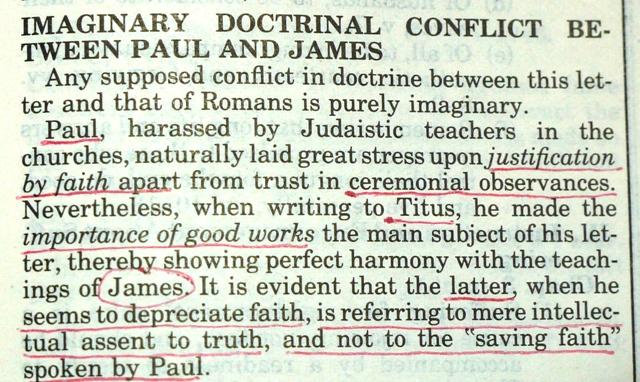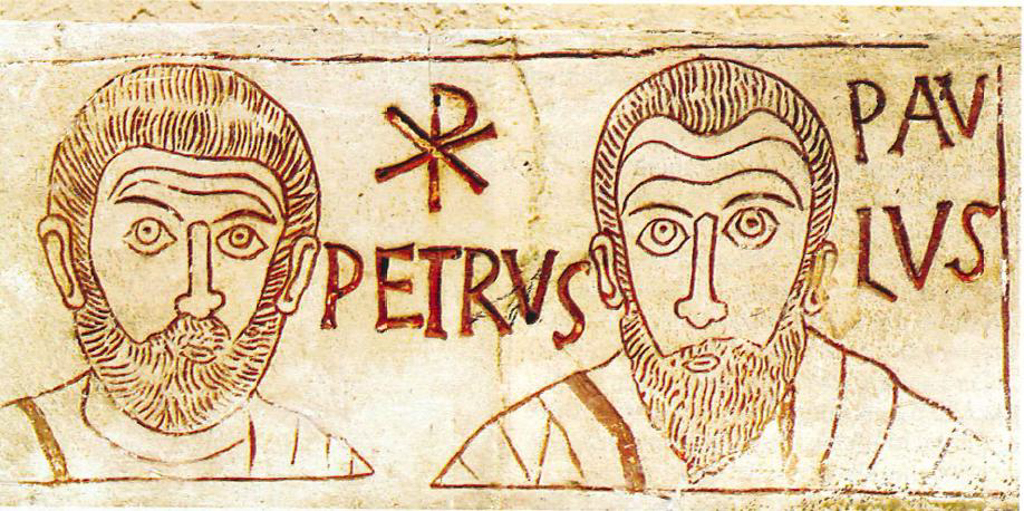The issue on faith and works is always a hot topic. One group claims that salvation is by faith alone while another group claims that salvation is not only by faith but also at the same time, by works. That is, salvation by faith and works. By “works” or “good works” they mean the keeping of the ten commandments and all of God’s commands. This belief is sometimes called, “salvation by works.” They place a high value and importance on the keeping of the law for salvation.
So what is really God’s Word on this matter? Is there a conflict between Paul and James? Getting the context for each of the epistle will tell us that the Bible is in harmony throughout each book or epistle. There is actually no conflict between Paul and James.
The Context of Paul
In the case of Paul’s epistles (please read through Romans, Galatians and Colossians), he was addressing issues where some Jewish Christians — take note, they were Christians too — were insisting that the Gentile Christians should also obey of the law of Moses in addition to believing in Christ (Acts 15:1, 5, Gal. 3). Please be sure to read the verses quoted to fully understand the context.
These Jewish Christians were insisting that the Gentile Christians needed to also keep the law of Moses. aside from following Christ. Christ was insufficient for salvation, according to them (Colossians 1-2). They needed to keep the Law of Moses as well in order to be saved, they claimed. For them, believing in Christ was not enough.
But Paul argued that they were complete in Christ—they had fullness in Christ (Col. 1:19, Col. 2:9-10). Nothing more was needed. All they needed was Christ. All they needed was faith in Christ. This was what Paul was arguing about and is the context of his epistles. Paul insisted that Christians were not under the law of Moses but rather, they were under the law of Christ (1 Cor. 9:20-21; Gal. 6:2). They were not under law but under grace (Rom. 6:14).
So in Paul’s epistles, the issue was: What can justify them before God? Is it faith or is it works? Paul’s answer? Faith alone, without the observance of the law of Moses (works). Here’s Galatians 2:16:
know that a man is not justified by observing the law, but by faith in Jesus Christ. So we, too, have put our faith in Christ Jesus that we may be justified by faith in Christ and not by observing the law, because by observing the law no one will be justified.
This verse is quite clear and needs no further explanation. Can we gain righteousness through the law of Moses (or any other law for that matter—including the ten commandments)? Galatians 2:21 says, No!
“I do not set aside the grace of God, for if righteousness could be gained through the law, Christ died for nothing!”
Lest you think Paul is against good works, please take note that in the epistle to Titus (in another context), Paul emphasized the importance of doing good works. To do good works is encouraged for Christians (Eph 2:10). But the main issue in Paul’s other epistles is whether the Law of Moses (or any other law you could mention) is required for salvation and the clear answer from Paul is, NO! We are saved by grace through faith (Eph. 2:8).
The Context of James
In the case of James, it is altogether a different set of circumstances. The first two chapters of James show that the early Christians — take note again, these were Christians whom James addressed — were showing partiality, favoritism, and the love of some (their “faith,” their religion) were merely lip-service. They were not actually loving and helping their fellow brethren. They were merely listening but not doing (James 1:22). They were not practicing pure and undefiled religion which is to actually help the widows and fatherless (James 1:27).
With this context in mind, James explained that real faith is evidenced by good works. Perfect faith is shown by good works. These early Christians needed more than mere acknowledgement of the truth. They needed to live out the truth. If their faith were for real, it will naturally show in good works. That is the context.
Is this in conflict with Paul’s argument? Of course not! This is a totally different context. James was talking to Christians whose “faith” was not lived out in Christian love for the brethren.
While, in Paul’s epistles, he was arguing against the Jewish Christians who insisted that the Gentile Christians should also keep the Law of Moses aside from believing in Christ in order to be saved. Therefore Paul said, salvation is by faith alone without the observance of the law! Faith alone, without works. That is the real context.
Paul and James were not in conflict. The Bible is in harmony.
Ephesians 2:8-9 says:
“For it is by grace you have been saved, through faith–and this not from yourselves, it is the gift of God–not by works, so that no one can boast. 10 For we are God’s workmanship, created in Christ Jesus to do good works, which God prepared in advance for us to do.”
Yes, we were created to do good works. For a convicted criminal on death row who has been given a presidential pardon, to obey the law (doing good works) when he goes out of jail is expected of him. It’s the right thing to do. He’s not supposed to break the law again. The keeping of the law is not something that saved him. In this illustration, it’s the presidential pardon that saved him. It is the same with salvation. Christ alone saves. To keep the law does not save us. We are expected to keep the law. It’s the right thing to do after having been saved by Christ.
So, are we saved by doing good works? No, we have been saved by grace through faith in Jesus Christ. So, is “salvation by works” biblical? No. What then is the Bible’s teaching on salvation? We are saved by grace through faith in Christ alone!

A commentary from the Thompson Chain Reference Bible
Photo Credit: Google

